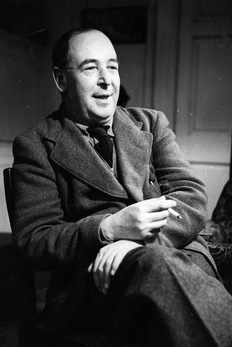C. S. Lewis

Clive Staples Lewis (1898–1963) was brought up in the Church of Ireland but lost his faith as a teenager. After being wounded in the trench warfare of the First World War, he returned to Oxford to study literature and philosophy. It was not until his early thirties that, under the pressure of his own developing thought and the influence of friends such as J. R. R. Tolkien, Lewis returned to the Christian fold as an Anglican.
Lewis was a founding member of the Inklings, a literary group that also included such important figures as Tolkien and Charles Williams. Lewis became professor of medieval and Renaissance literature at Cambridge University and was well-respected in his field, but he is best known for his prolific output as a Christian novelist and apologist. Lewis had a great gift for explaining some of the thorniest areas of Christian doctrine in a way that showed them to be sheerest common sense. His writings have helped bring thousands into the Church and continue to be read by millions seeking to understand better what they believe.
It is more important that heaven should exist than that any of us should reach it. (“Surprised by Joy”)
God is more than a god, not less; Christ is more than Balder, not less. We must not be ashamed of the mythical radiance resting on our theology. We must not be nervous about “parallels” and “Pagan Christs”: they ought to be there—it would be a stumbling block if they weren’t.... For this is the marriage of heaven and earth: Perfect Myth and Perfect Fact: claiming not only our love and our obedience, but also our wonder and delight, addressed to the savage, the child, and the poet in each one of us no less than to the moralist, the scholar, and the philosopher. (“Myth Became Fact”)
If you are a Christian, you are free to think that all these religions, even the queerest ones, contain at least some hint of the truth. When I was an atheist I had to try to persuade myself that most of the human race have always been wrong about the question that mattered to them most; when I became a Christian I was able to take a more liberal view. (“Mere Christianity”)
“Why—damn it—it’s medieval,” I exclaimed; for I still had all the chronological snobbery of my period and used the names of earlier periods as terms of abuse. (“Surprised by Joy”)
You must picture me alone in that room in Magdalen, night after night, feeling, whenever my mind lifted even for a second from my work, the steady, unrelenting approach of Him whom I so earnestly desired not to meet. That which I greatly feared had at last come upon me. In the Trinity Term of 1929 I gave in, and admitted that God was God, and knelt and prayed: perhaps, that night, the most dejected and reluctant convert in all England. I did not then see what is now the most shining and obvious thing; the Divine humility which will accept a convert even on such terms. (“Surprised by Joy”)
There are no ordinary people. You have never talked to a mere mortal. Nations, cultures, arts, civilisations—these are mortal, and their life is to ours as the life of a gnat. But it is immortals whom we joke with, work with, marry, snub, and exploit—immortal horrors or everlasting splendors.... Next to the Blessed Sacrament itself, your neighbor is the holiest object presented to your senses. (“The Weight of Glory”)
I believe in Christianity as I believe that the Sun has risen, not only because I see it, but because by it I see everything else. (“Is Theology Poetry?”)
Web Resources
